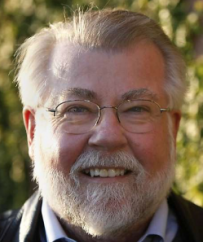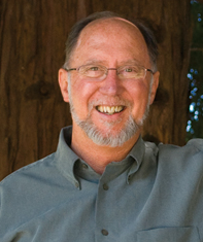For decades, The Planning Report has focused on both on land-use planning and on how public authorities ought to address the impacts of climate change. Therefore, many TPR interviews have assessed public policy, infrastructure initiatives, and plans to better adapt to as well as mitigate the increasing threat of environmental events caused by fire, drought, sea level rise, and earthquakes. California’s Lieutenant Governor duties include representation on the state Lands Commission, Ocean Protection Council, and Coastal Commission. With the aforementioned serious duties in mind, TPR interviewed two respected and knowledgeable environmental stewards—Reed Holderman and Will Travis—to get their take on whether it made a difference who becomes California’s next Lt. Governor.

Will Travis
“Bleich has now earned the support of every major newspaper that has endorsed in the Lt. Governor’s race.”
"Jeff Bleich innately understands why Californians care so much about our environment. He gets why advancing equity and environmental justice are essential to protect public health and the planet. He has experience as a lawyer and a public servant that prepare him for the duties of Lieutenant Governor, including those important duties that influence how the state addresses state lands, coastal waters and natural resources. Hands down, he’s the best candidate for Lieutenant Governor in 2018 and we’re proud to give him Sierra Club’s endorsement.” - Sierra Club
California’s Primary on June 6th offers registered voters an opportunity to vote for a new Lieutenant Governor. As experienced leaders and environmental stewards of public agencies and respected NFP organizations, does it matter to either of you who is elected to be the State’s 50th Lt. Governor?
Reed Holderman, former Executive Director of Sempervirens Fund and Western Regional Director and Senior Vice President of Trust for Public Land: It can and should matter. I am not sure how much it has mattered in the past, but we are in a far better position having a spokesperson like Jeff Bleich out there talking about the future and what we need to do to prepare for it. And that future is not just about the environment either, but also about affordable housing, inclusion, and employment. Big changes are coming and Jeff understands that we need to get ahead of them and bring both our people and our planet into the future.
Jeff is someone who thinks deeply about these issues, cares about them, and is committed to doing something productive as Lt. Governor. He wants to use this office as a fulcrum for change.
Will Travis, former Executive Director of the San Francisco Bay Conservation and Development Commission (BCDC), as well as the recipient of the Jean Auer Environmental Award presented by the San Francisco Estuary Partnership: It matters a great deal who the Lt. Governor is. I think of the Lt. Governor as the most apolitical political office in the California cabinet. It is the policy-wonk in chief—and has the potential to be the thought-center of government. A number of the policy positions for the entire state pivot around the commissions and boards that the Lt. Governor sits on and participates in.
Will, as a former leader of the Bay Conservation and Development Commission, rising sea level has been your area of expertise for decades. How could the next California Lt. Governor leverage board participation on the Coastal Commission, State Lands Commission, the Ocean’s Protection Council and the Commission for Economic Development, as well as the UC regents and CSU trustees, to better contribute to public policies you have spent a lifetime crafting and administering?
Will Travis: I am most familiar with the Bay Conservation and Development Commission, which is the state coastal management agency for San Francisco Bay. Although the Governor has appointees to the commission, the Lt. Governor is able to coalesce all state policy because the Lt. Governor sits on so many other commissions simultaneously. The Lt. Governor allows policy to be applied in a cohesive manner. The other commissioners also pay great attention to the Lt. Governor’s position and thoughts.
Reed, as former executive director of the Sempervirens Fund and a senior leader of Trust for Public Land, what impact could the next Lt. Governor have on the State’s Lands Commission?
Reed Holderman: I think Jeff’s impact could extend well beyond the State Land Commission. He would be the only constitutional officer not consumed with politics or the business of running the state or a state department. He would be free to bring attention to the important issues affecting us all and could galvanize public support to make change possible. This is one of the things I believe Jeff Bleich will do well. He is someone who gets things done. We are living in a world where there are a number of potential environmental train wrecks coming. We need a leader who can get ahead of these problems and rally us to act before it’s too late. Jeff’s that guy.
Governor Brown announced last year that California must become more resilient in response to the “new normal” that climate change will bring to our state. What are the challenges cause by the “new normal” for California?
Reed Holderman: There are a number of things we can do to prevent the devastating impacts of drought, wildfires, and sea level rise. We have known these things for some time now. The Governor said we need to be more aggressive on this front and I agree with him. Someone needs to take his baton and take it to the next level.
When you talk about catastrophic fires, we have known for decades that a century of fire suppression has only made wildfires burn hotter and longer causing horrific lost of life, property damage, and release of harmful smoke into the air we breathe. While fires will always we with us, there are things we can do and expand upon that may give us as edge as our temperatures increase and rainfall becomes more sporadic.
We can start by reducing fuel loads and brush along roads, trails, campgrounds, and buildings where fires typically start.
We can also accelerate pace of creating alternating fuel blocks (i.e. areas of reduced vegetation) within our forests to better manage and contain fires once they start. And we need to reduce fuel loads in the forests themselves by thinning over-stocked forests and removing most, but not all, of the down woody debris that keep large fires burning once they start.
Our goal should also be to retain and expand our old growth forests because they are more fire resistant, provide better wildlife habitat, and sequester more carbon. Fires release carbon into the atmosphere and old growth forest soak it up. If we can reduce catastrophic fires and expand our old growth forests, and old growth candidate forests (the next generation), we might actually get ahead of the game and be better prepared for what’s coming.
Will, as coastal erosion worsens and public beaches are eviscerated, jurisdictions can choose to either fight or adapt to nature? How would you describe California’s current responses to sea level rise?
Will Travis: The current policy is based on the past. For the past 8,000 years, our climate has been stable. We humans, as a civilized species, have only been around for about 6,000 years. During this entire period of time, we have not had any great amount of ice melting or water freezing. As a result, the shoreline has not dramatically moved.
We have a whole body of law based on the simple belief that our shoreline is staying put. We are now entering a period where that is no longer true. The laws that have been enacted were for a different set of conditions. We need dynamic leadership to pivot us away from the old paradigm. If we follow the old laws, we will be in deep trouble and deep water.
Jeff has demonstrated that he has the capacity to lead, and think deeply about what the law should be. He has proven that he can go deeper than the accepted norm to find effective, forward-looking public policy solutions.
It has been said in past elections that the thinking man’s candidate is infrequently the electoral favorite to win. Given both of your interactions with elected state officials, what leadership qualities are likely to win votes this year?
Will Travis: As a big fan of Leon Panetta who has said, “In a democracy, you either govern by leadership or by crisis.” We need leadership today. Jeff Bleich has demonstrated that he can lead.
Reed Holderman: Living in a global community, we need to look beyond regional solutions. I like that Jeff has been the Ambassador to Australia and has been in the White House. He’s learned first-hand what others have done to solve our most pressing environmental problems and can apply these lessons here.
Reed, it is clear that many people are increasingly relying on their affinity groups for advice on how to vote. Who have the state’s respected environmental organizations endorsed for Lt. Governor?
Reed Holderman: You would think that the groups that have the protection of the environment in their mission statement would be focused on environmental issues first and foremost, but I am not sure that is always the case. Everyone is trying to pick the “winner” and money and politics sometimes plays a role in the endorsement process.
The Sierra Club, along with every newspaper in the state, were very smart to endorse Jeff. He has the most relevant experience and has a very progressive environmental agenda. Paying for a political ad saying you will do something about climate change isn’t the same as knowing what to do or how to do it. Jeff is the only one who has this knowledge and experience.
But you are right. People are probably are not focused on this race or even on the primary election. If Jeff makes into the general election, and I believe he will, he will start to get the attention he deserves as the two final candidates begin to differentiate themselves.
Will, what have you observed about how environmental groups make their electoral recommendations?
Will Travis: Unfortunately, I think the groups are sometimes representing very narrow interests. Jeff’s breadth of knowledge and experience is very attractive from a policy-making standpoint. We are seeing in the country’s current political polarization the dangers of one-issue candidates. Jeff is able to balance different interests and reach thoughtful conclusions.
Let’s close with what you believe Elvis would say about this important office and election?
Reed Holderman: Elvis might say ‘Turn on the lights. I’m ready for primetime.’ Jeff Bleich cares about the future of California and has displayed a thoughtful and passionate approach to improving the state. He may not be Elvis, but he is ready for primetime!
- Log in to post comments




